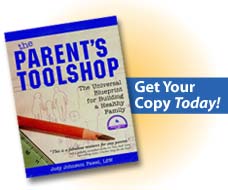We, at Parents Toolshop® — well, actually every parenting division of our parent company, Relationship Toolshop® International Training Institute, LLC — adhere to and promise to only teach you “research-based, trauma-informed best practices” in parenting.
Yes, even if your child does not have a known trauma history, it’s important you know and use these parenting practices, which are all evidence- or research-based.
Here’s why and why you need to understand the difference so you can screen other parenting programs and resources and discern whether to follow what they teach.
Definitions
Trauma-informed parenting practices:
While there is no established definition or standards for what is trauma-informed, it is easy to understand the meaning of the term. Children who have a trauma history require caregivers who have specialized knowledge and skills about how trauma affects children’s development, brains, behavior, and more.
How you interpret children’s behavior and respond to it also needs to take the child’s trauma into consideration. Many “common” parenting practices may seem harmless when used with children who don’t have a trauma history (such as corporal punishment, bribing or restricting food, removing children’s belongings from messy rooms or bedroom doors that they have slammed, etc.) They might even seem to “work” in getting short-term results, but they are, at the least, ineffective quick fixes that can have negative or even counter-productive outcomes for all children long-term.
With children who have a trauma history, these same practices can have surprisingly different and more extreme effects on children. For example:
- Corporal punishment is a trauma trigger for children who have witnessed or experienced domestic violence; even witnessing other children being spanked is a trigger.
- Using food to manipulate can exacerbate food issues, which traumatized children often have.
- Many children have never had toys or a room, so removing them can be traumatic for them, increasing their insecurities and fears, especially when compared to children who have not experienced neglect, dependency or abandonment.
As a result, our standard, whether we are training foster parents or parents of children without a trauma history, we minimally teach parents skills that research has shown to be effective long-term. Ideally, we strive to always teach trauma-informed parenting practices, because not all children with a trauma history are foster children. Trauma can happen to good children from good families with great parents! (If you’ve read my family history in the Introduction of The Parent’s Toolshop® book you know this.) Trauma-informed practices take into account similar concepts all parents need to consider, such as resolving underlying issues that are driving behavior instead of just reacting to and trying to stop the superficial behavior. So they are imporant and helpful for all parents to know and use.
Evidence- or Research-based “Best” Practices:
There also aren’t any established definitions of these three terms, which are often used interchangeably. So our definition of “evidence- or research-based” is quite simple: we want whatever you teach to be backed up by valid scientific research. If we (Jody or our certified instructors) share an opinion or experience, they’ll tell you that’s all it is. They will also, whenever possible, be transparent and cite the research that backs what they are teaching in their program or resource.
I’m on the board of the National Parenting Education Network (NPEN) and chair the committee that researches and establishes professional (and paraprofessional) competencies in the field of parenting education. These committees often cite (and complain about) the inconsistencies among “evidence- or research-based” parenting programs and the clearinghouses that compile lists of them. For example:
- There is a lack of consistency in how evidence-based programs (EBP) are rated and identified among clearinghouses funders require agencies use to receive funding. So proven-effective programs can be excluded from these lists. For example:
- Many only lists approve programs that have a pre- post- data-collection design with control and intervention groups. That means the control group is denied services, which many parenting programs (including The Parent’s Toolshop®) won’t do for ethical reasons.) There are other valid research and evaluation methods the lists don’t consider or include.
- Research design is time-consuming and expensive, making it beyond the ability of many parenting education programs to conduct. Thus, they may actually be an EBP but won’t qualify for inclusion on these lists.
- The goals of the programs on the clearinghouse lists tend to be very specific, such as changes in children’s behavior, parental behavior, or the avoidance or prevention of undesired outcomes. This doesn’t allow for a broader range of evaluation methods or programs that have an equally-valuable focus beyond those listed.
- There is also an assumption that for a program to be effective it must be conducted exactly the same as how it was implemented in the study. Yet, good parenting educators know they need to adapt a program to meet the needs of the parents with whom they are working. That means that the assumptions on which these lists approve EBPs actually run counter to what produces good parenting education!
- Lastly, the goals or methodology of some programs that made it onto these EBP lists are not the goals of many parents and in some cases are not consistent with those that are identified as best practices for the field of parenting education. For example, programs that focus on external rewards and punishment to achieve short-term behavior modification goals are included on these lists, because they completed a research project using an experimental design that showed positive outcomes. Well-established long-term studies have shown this approach is not effective long-term and is actually even counter-productive. (i.e., Alfie Kohn)
- There is also now a movement for parenting educators to obtain remuneration for their services, which will also likely be tied to these lists of EBP parenting education programs because there is no one common standard for training and certification in the parenting education field.
Beyond what we present, verbally or in writing, we also please pay attention to who/what resources we refer or recommend to parents. There are programs that get accepted onto lists of evidence-based programs so they can receive funding that do not teach what’s considered evidence-based “best practices” in parenting education! While their program might have shown short-term positive outcomes, long-term evidence has shown not only are their teachings ineffective, but in some cases may even be counter-productive or harmful. We want to avoid giving quick fixes that backfire, so teach skills and concepts backed up by valid long-term research.
All this is to show you just how committed we are at Parents Toolshop® (and Relationship Toolshop® as a whole company) to making sure the information we provide to you is the most current, accurate, research-based, outcome-evidenced parenting practices possible.
For more information, you can review:
- The results of our own ten-year long outcome research study of the effectiveness of The Parent’s Toolshop® program with diverse populations, which isn’t on any of the clearinghouse lists because we didn’t have a control group to whom we refused services.
- A free guide to Screening and Weeding Parenting Advice.


